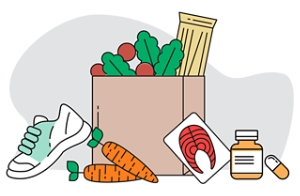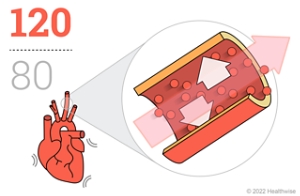Learning About High Blood Pressure
It's normal for blood pressure to go up and down throughout the day. But if it stays up, you have high blood pressure (hypertension). High blood pressure means that your blood is pressing on your arteries with too much force. For diagnosis, the top number may be 130 to 140 or higher. The bottom number may be 80 to 90 or higher.
Usually it doesn't cause symptoms. But over time, it can cause damage. High blood pressure increases the risk of stroke, heart attack, vision loss, and dementia.
Your doctor will give you a goal for your blood pressure. Your goal will be based on your health and your age.
A healthy lifestyle, which includes eating healthy and being active, is always important to help lower blood pressure. You might also take medicine to reach your blood pressure goal.

Your doctor will give you a goal for your blood pressure. Your goal will be based on your health and age.

Eating healthy foods, not smoking, and being active can help lower blood pressure. You might also take medicine to reach your blood pressure goal.
Tips for preventing high blood pressure

Stay at a healthy weight. Talk to your doctor about what a healthy weight is for you.

Limit salt (sodium). Try to limit how much sodium you eat to less than 2,000 milligrams (mg) a day (5 grams of salt or 87 mmol of sodium per day). Use no or less salt in recipes. And buy foods labelled "unsalted," "sodium-free," or "low-sodium." Foods labelled "reduced-sodium" and "lightly salted" may still have too much sodium.

Find new ways to flavour food. Try garlic, lemon juice, onion, vinegar, herbs, and spices instead of salt. Avoid things like soy sauce, steak sauce, mustard, and ketchup.

Get at least 2½ hours of moderate to vigorous exercise a week. Walking is a good choice. Swimming, running, or team sports may also work for you.

If you drink alcohol, try to drink less. Your risk of harm from alcohol is low if you have 2 drinks or less per week.

Eat plenty of fruits, vegetables, and low-fat dairy products. Eat less saturated fat (like red meat and full fat dairy), and limit sweets and sugary beverages.
Understanding the numbers

Two numbers tell you your blood pressure. The first (top) number shows how hard the blood pushes on your artery walls when your heart pumps.

The second (bottom) number shows how hard the blood pushes on your artery walls between heartbeats, when your heart relaxes.
Where can you learn more?
Go to https://www.healthwise.net/patientEd
Enter P501 in the search box to learn more about "Learning About High Blood Pressure".
Adaptation Date: 08/15/2023
Adapted By: Alberta Health Services
Adaptation Reviewed By: Alberta Health Services
